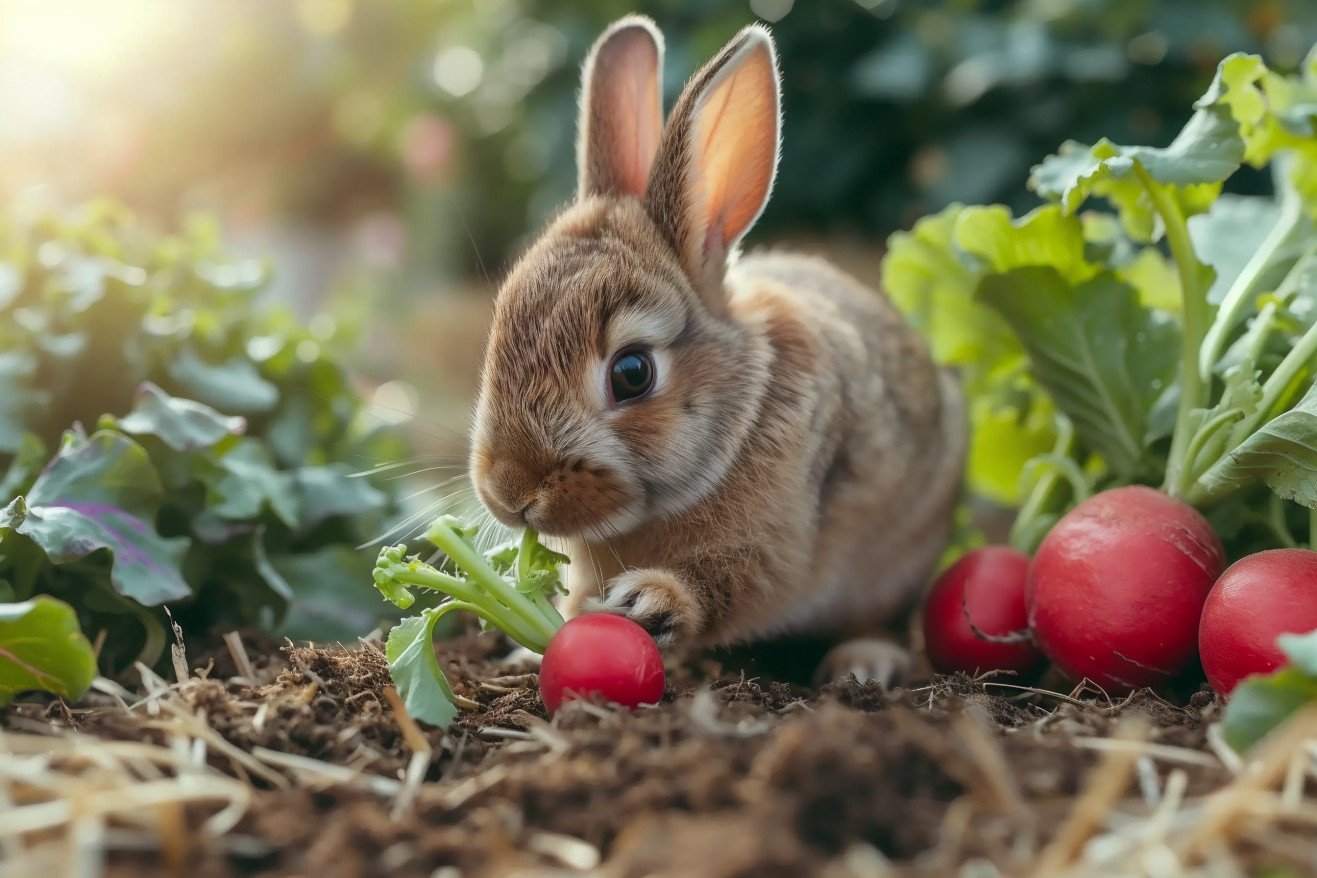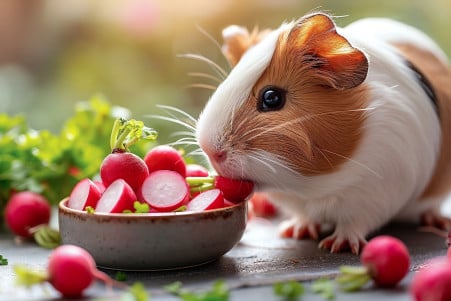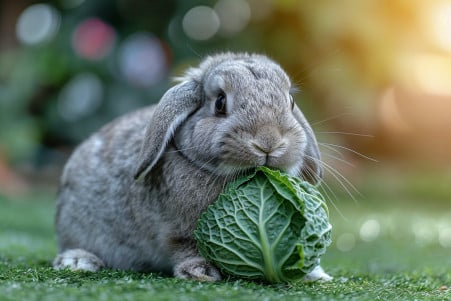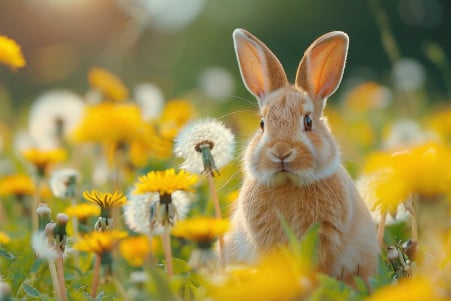Can Rabbits Eat Radishes? Nutritional Facts and Feeding Tips
10 February 2024 • Updated 9 February 2024

While radishes are a satisfyingly crunchy snack for people, can rabbits enjoy them as well? Rabbits can eat radishes, including the leafy radish greens, in moderation. However, they should be considered a treat because the roots are high in starch. As with any new food, introduce radishes to your rabbit’s diet slowly and watch for any signs of digestive issues since rabbits should eat a diet that’s mostly hay.
In this article, we’ll explore the question of whether radishes are good for rabbits by looking at a range of nutritional research and expert advice. Along the way, we’ll learn about the complexities of rabbit digestion and the nutritional content of radishes.
We’ll also discover how to make sure you’re giving your rabbit a well-rounded diet that includes treats in a way that’s healthy and safe. By the end of this in-depth guide, you’ll have the information you need to make the best choices for your rabbit’s diet.
Let’s get started by taking a closer look at what rabbits eat in the wild and how their digestive systems work.
Can rabbits eat radishes?
Nutritional Balance: Radishes as a Part of a Rabbit’s Diet
Although radishes are not a rabbit diet staple, they can provide rabbits with a range of vitamins, minerals, and fiber when consumed in moderation. Rabbit Care Tips explains that radishes are a good source of vitamin C and fiber, and their high water content can help with hydration.
Pet Keen agrees that radishes are a good source of nutrition, and in particular, the water and fiber in radishes can help ensure that rabbits have regular bowel movements.
Meanwhile, Dr. Kathryn Rosalie Dench observes that radishes are high in antioxidants and contain potassium and calcium, although she warns that radishes are high in oxalates and calcium, which can be problematic for rabbits.
Rabbit Care Tips also explains that the leafy greens of radishes, which are especially nutritious, can be added to a rabbit’s daily salad. On the other hand, the high starch content of radish roots means that they should be fed to rabbits in moderation to avoid weight gain and digestive issues, including gas, which can be life-threatening for rabbits due to their inability to expel it.
To ensure that rabbits have a well-rounded diet, radish greens should be included in their meals on a regular basis, with a small handful being an appropriate amount to add to their daily greens.
Radish roots, on the other hand, should be fed to rabbits in small amounts (about the size of a quarter) once or twice a week, according to Dr. Kathryn Rosalie Dench. This way, rabbits can enjoy the many benefits of radishes while still meeting their essential dietary needs for high fiber and low starch.
By feeding rabbits radishes in moderation, rabbit owners can help ensure that their pets have healthy digestion and a varied diet.
How Fiber Impacts Rabbit Health
Fiber is the foundation of a rabbit’s diet and is critical to their digestive health and overall well-being. Because rabbits are herbivores with a unique digestive system, fiber is necessary to keep their gut moving and healthy. A study in The Veterinary Nurse explains that fiber is also important for grinding down a rabbit’s continuously growing teeth and for helping the rabbit’s large caecum absorb nutrients.
One way that radishes can help rabbits is by contributing to their fiber intake. Radish leaves contain both soluble and insoluble fiber, which are important for maintaining a healthy digestive system. Insoluble fiber helps keep the digestive system moving and healthy, while soluble fiber is fermented by the good bacteria in the gut.
A study in PubMed found that rabbits that were fed a low-fiber diet when they were young ate less and had digestive issues. However, the high fiber content of radish leaves can help counteract these issues when they are fed to rabbits in the right way.
It’s important to make sure that rabbits get a mix of fiber types, and a study in ScienceDirect showed that a combination of digestible and indigestible fibers is important for maintaining gut health and preventing digestive issues.
It’s easy to add radish leaves to a rabbit’s diet. You can start by adding small amounts to their regular hay and then gradually increase the amount to make sure that they have a fiber-rich and varied diet. This will help ensure that you’re supporting their unique digestive system and helping them stay happy and healthy.
Understanding the Rabbit’s Special Digestive System
Rabbits have a unique digestive system that has evolved to efficiently process high-fiber diets. According to Purina Animal Nutrition, rabbits are hind-gut fermenters, meaning they have a cecum that houses a microbial population that ferments fibrous material, similar to the cow’s rumen. This fermentation enables the rabbit to absorb volatile fatty acids and produce cecotropes, which are nutrient-packed and essential to the rabbit’s well-being.
As Supreme Petfoods explains, rabbits need a high-fiber diet to ensure they get enough fiber and to keep their gut motility regular. If rabbits don’t get enough fiber, they can experience serious digestive problems, including stasis, bloat, and ileus, all of which can be fatal.
When it comes to adding new foods like radishes to a rabbit’s diet, it’s important to be careful. Radishes can be a good addition to a rabbit’s diet in moderation, but a sudden change in diet can disrupt the rabbit’s gut microbiome.
Supreme Petfoods explains that the key to a rabbit’s diet is high-quality fiber, so if you want to add radishes to your rabbit’s diet, it may be best to start with the radish greens.
Whenever you change a rabbit’s diet, it’s important to watch for signs of digestive upset. According to Supreme Petfoods, this includes diarrhea, a change in eating habits, and not eating cecotropes. If you notice any of these signs, it’s important to contact your veterinarian right away. If you’re thinking about adding radishes to your rabbit’s diet, make sure to watch your rabbit closely for signs of digestive upset to ensure a smooth transition.
How to Add Radishes to Your Rabbit’s Diet
Make sure your rabbit stays healthy and happy by introducing radishes to its diet in a safe and controlled way. To start, give your rabbit a small piece of radish root that’s no bigger than a quarter and watch for any signs of digestive issues, according to New Rabbit Owner. If your rabbit seems to tolerate the root, you can decide whether you want to give it to your rabbit as an occasional treat.
If you want to give your rabbit a healthier option, focus on the radish greens. Central Victoria Hay explains that radish greens are full of nutrients like fiber, vitamins, and minerals that are great for your rabbit.
To introduce them, mix a small amount of organic, thoroughly washed radish greens with your rabbit’s regular greens. If your rabbit doesn’t have any issues, you can slowly increase the amount of radish greens in the daily portion of fresh vegetables that you give it.
Rabbits Life points out that you should make sure to buy organic radishes to avoid the dangers of pesticides. You can also mix in other leafy greens like romaine lettuce, arugula, or basil to make sure your rabbit is getting a well-rounded diet.
If your rabbit doesn’t like radishes or you want to mix things up, try these alternatives that will give your rabbit a similar nutritional boost and keep things interesting for your furry friend at mealtime.
In Conclusion: Radishes for Rabbits
In conclusion, radishes can be a fun, crunchy treat for rabbits, but it’s important to use them in moderation. The leafy greens are a better option, especially since they provide important fiber and vitamins without the starch that’s present in the roots.
As mentioned earlier, rabbits need a high-fiber diet to support their unique digestive system, with hay as the primary component. Any new food, including radishes, should be introduced slowly and with close attention to the rabbit’s digestive and behavioral responses.
Responsible rabbit owners know that taking care of their pets’ dietary needs is an important part of making sure they are healthy and happy. By providing a well-rounded diet, paying attention to their rabbit’s individual needs, and responding to their health issues, owners can make sure that their pets are well-cared for.
It’s also important to remember that a rabbit’s health is a reflection of the care it’s receiving, and it’s up to us as owners to make sure that they are getting the best nutrition possible.


